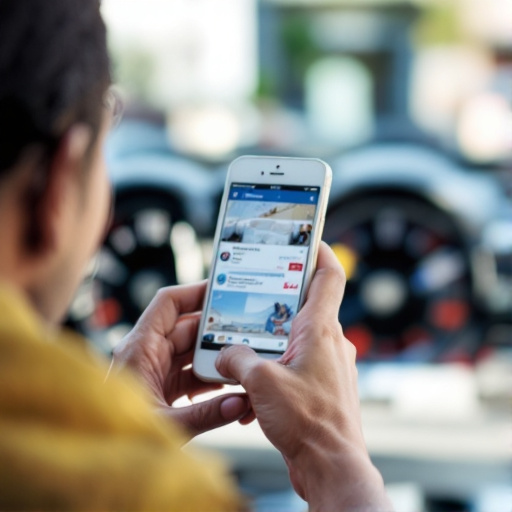Related Articles
- Unveiling the Unthinkable: How Your Social Media Posts Could Impact Your Car Insurance Premiums
- "From Showroom to Social Media: How Dealerships are Becoming Digital Storytellers in 2023"
- "From Showroom to Stream: The Rise of Virtual Reality Test Drives at Dealerships"
- Revving Up Sales: How Virtual Reality is Transforming the Dealership Experience for Shoppers and Sellers Alike
- Selling Experiences: How Dealerships Can Transform into Immersive Automotive Entertainment Hubs
- The Surprising Impact of Your Credit Card Habits on Car Financing: What You Didn't Know!
Uncovering the Surprising Link Between Car Insurance Rates and Your Social Media Habits
Uncovering the Surprising Link Between Car Insurance Rates and Your Social Media Habits
Have you ever wondered what your social media habits have to do with your car insurance rates? In this article, we delve into the unexpected relationship between your online presence and how insurance companies assess risk, potentially affecting how much you pay for coverage.
Decoding the Connection
In today's digital age, where our lives are increasingly documented online, it becomes crucial to understand how our social media presence influences various facets of our lives. Car insurance, as mundane as it might seem, is one of those areas where your online persona could very well alter the rates you pay.
The New Breed of Data Assessment
Insurance companies are not just tallying up your driving history anymore. According to a report by McKinsey & Company, 70% of insurers are utilizing non-traditional data sources, including social media, to determine risk profiles. This means that factors like your online interactions, engagement levels, and even the type of content you share could very well be factored into your insurance premiums.
A Cautionary Tale
Let’s explore a fictional case that illustrates this surprising relationship. Meet Jake, a 25-year-old who loves sharing thrill-seeking adventures on social media. He often posts pictures of himself riding dirt bikes and driving fast cars on winding mountain roads, complete with adrenaline-filled captions. While Jake thinks he’s just sharing fun moments, potential insurers view those posts as red flags, possibly categorizing him as a higher-risk driver.
The Data-Driven Reality
In fact, a study by Insure.com suggested that individuals who frequently share risky or reckless activities online are likely to face higher insurance premiums. It found that 54% of insurers cite social media as a tool to gauge customer behavior and risk levels. If you have enthusiastic posts about your love for speed and adventure, your rates could rise compared to someone who posts environmentally-friendly driving tips.
Social Media and Personal Branding
Now, let’s pivot to the benefits of a responsible online presence. Your social media isn’t just a reflection of your daily activities; it's a personal branding tool. The way you curate your profile can sway an insurance company’s perception of you. Someone who consistently shares caring, community-oriented content might be seen as more responsible, potentially leading to lower rates. So, think twice before you tweet your last wild weekend; the way you project yourself online could very well have real-world impact.
The Numbers Game
Statistically speaking, the implications of social media habits on insurance rates can be profound. For example, if a company finds a direct correlation between high community engagement on platforms like Facebook and lower risk levels, they might adjust a policyholder's premiums by 15% or more for similar demographics. Every post you make adds to an ongoing narrative that insurers might see as either advantageous or detrimental.
The Behavioral Insights
As insurance companies delve deeper into behavioral economics, they find that social media engagement provides insights into an individual’s lifestyle choices. Higher engagement can signal community ties, possibly indicating a lower risk likelihood. If you often post about volunteering or family road trips instead of wild parties, you are more likely to be seen as a responsible insurance customer. Companies may reward this perceived stability with lower rates.
The Role of Privacy and Anonymity
As intriguing as it sounds, the relationship between social media and insurance isn’t without its ethical concerns. Many individuals are not aware of what's being assessed in their insurance quotes. A survey by Pew Research found that 79% of social media users don’t think their online behavior should affect insurance costs. Privacy issues come into play; should insurers be allowed to evaluate applicants based on what they post and share online?
Counteracting High Rates
Now, if you find yourself in a situation where your social media activities are actually elevating your insurance rates, what can you do? One approach is to keep your online presence professional, posting content that reflects your reliability and good character. That means steering clear from any reckless behavior and focusing instead on showcasing responsible decisions. Additionally, regularly reviewing your privacy settings is essential to limit who can see your posts.
Notifications & Reminders
Another useful tip is to set reminders for yourself. Consider a text or app notification that pops up reminding you not to share potentially risky content. You might even decide to journal instead of posting spontaneous adventures online if they could jeopardize your car insurance premium.
Social Media Marketing Influence
Interestingly, insurance companies are also leveraging social media marketing strategies to build relationships with customers. They might even engage with you based on your content, sending personalized messages about maintaining good driving habits or offering deals on safe driving courses. How cool is that? Instead of just receiving a generic renewal bill, you could receive interactive communications tailored to your online behaviors.
Data Scrutiny in Modern Times
It’s a brave new world out there, and data scrutiny is just the beginning. Insurers are increasingly investing in predictive analytics tools based on non-traditional data. The lucky policyholders who embrace safe driving practices online, share those secrets, or simply keep their social media life low-key will often reap the benefits.
Engagement Matters
Not only do consumers need to worry about how their online behavior is perceived, but they must also keep an eye on how they engage with insurers. Social media can serve as an excellent platform for both parties: you can ask questions both publicly and privately and manufacturers can publicize their benefits if the engagement is high. More engagement doesn't just reflect on you; it can also benefit your rates in the long run.
Shaping Next Generation Habits
Moving forward, especially for younger drivers who are digital natives, it’s vital to ponder the digital footprint you're creating. Future drivers will likely face even more scrutiny because they’ve grown up sharing their lives online. As a group, these individuals will need to curate their online behavior proactively or risk facing potentially increased rates later on.
A Cultural Reflection
Humor can also lend a unique light to the way we think about insurance and social media. Imagine a sitcom where the main character accidentally posts a video of themselves speed racing, only to receive a bill from their insurance company that reads, “Congratulations! Your new premium rate is… surprise!” It brings home the point that what happens on social media might have more serious repercussions than we think.
Conclusion: Bringing it All Together
As we unravel the seemingly unsuspecting link between car insurance rates and social media habits, it becomes painfully obvious that the choices you make online can have tangible effects in real life. While it's easy to see social media as harmless fun, understanding its broader implications is a necessary step toward responsible behavior in both digital and physical realms. So, the next time you hit "post," think about how it might ride shotgun with your wallet when it comes time to renew your car insurance!




